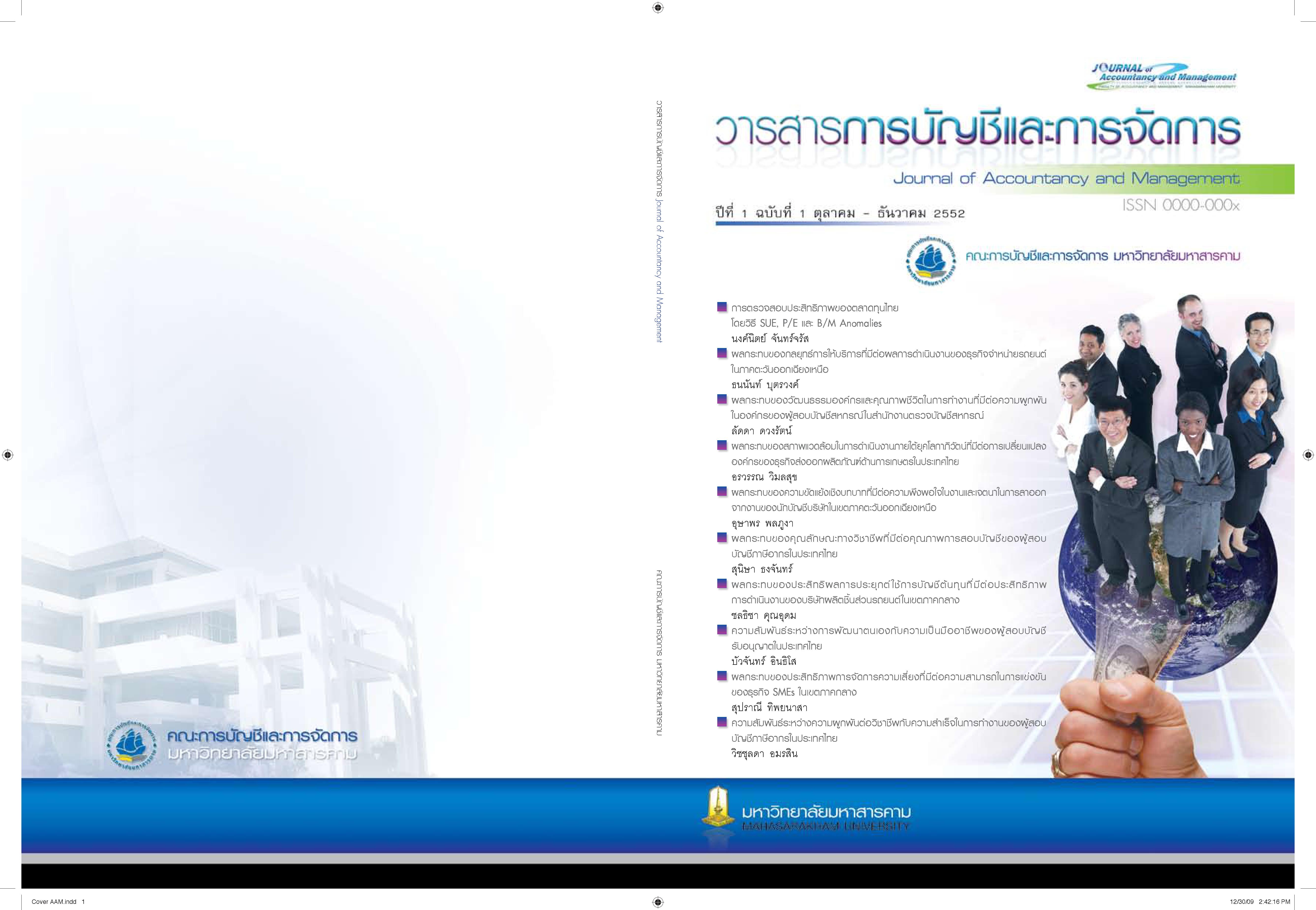ผลกระทบของความขัดแย้งเชิงบทบาทที่มีต่อความพึงพอใจในงานและ เจตนาในการลาออกจากงานของนักบัญชีบริษัทในเขตภาคตะวันออกเฉียงเหนือ
Main Article Content
บทคัดย่อ
การวิจัยครั้งนี้มีวัตถุประสงค์ เพื่อทดสอบผลกระทบของความขัดแย้งเชิงบทบาทที่มีต่อความพึงพอใจในงานและเจตนาในการลาออกจากงานของนักบัญชีบริษัทในเขตภาคตะวันออกเฉียงเหนือ ซึ่งความขัดแย้งเชิงบทบาทและความพึงพอใจในงานเป็นตัวแปรอิสระและเป็นตัวกำหนดเจตนาในการลาออกจากงานของนักบัญชีบริษัท ซึ่งทำการเก็บรวบรวมข้อมูลจากจากนักบัญชีบริษัทในเขตภาคตะวันออกเฉียงเหนือ เครื่องมือที่ใช้ในการวิจัยเป็นแบบ สอบถามใช้วิธีส่งจดหมายทางไปรษณีย์ เก็บรวบรวมข้อมูลจากนักบัญชีบริษัทในเขตภาคตะวันออกเฉียงเหนือ โดยมีผู้ตอบแบบสอบถามที่มีเนื้อความสมบูรณ์ทั้งสิ้น 303 คน ผลการวิจัย พบว่า 1) ความขัดแย้งเชิงบทบาท ด้านการแข่งขันสำหรับทรัพยากรและด้านอุปสรรคของการติดต่อสื่อสารมีผลกระทบเชิงบวกกับความพึงพอใจในงาน 2) ความขัดแย้งเชิงบทบาท ด้านปัญหาของสถานภาพและด้านคุณลักษณะของบุคคลมีผลกระทบเชิงลบกับความพึงพอใจในงาน 3) ความขัดแย้งเชิงบทบาท ด้านปัญหาของสถานภาพมีผลกระทบเชิงบวกกับเจตนาในการลาออกจากงาน 4) ความพึงพอใจในงาน ด้านกลุ่มและองค์กรมีผลกระทบเชิงลบกับเจตนาในการลาออกจากงาน นอกจากนี้ ประโยชน์ของการวิจัยสามารถที่จะนำไปใช้เป็นแนวทางในการปฏิบัติงานร่วมกันของพนักงานในองค์กรทุกคน เป็นข้อสนเทศสำหรับผู้บริหารได้ตระหนักถึงความขัดแย้งเชิงบทบาท ความพึงพอใจในงานและเจตนาในการลาออกจากงานของพนักงาน ตลอดจนหาแนวทางในการป้องกันและแก้ไขปัญหา ใช้เป็นแนวทางในการเสริมสร้างความสัมพันธ์และความเข้าใจอันดีต่อกันระหว่างผู้บังคับบัญชากับพนักงานในระดับปฏิบัติการ อีกทั้งยังช่วยแนะแนวทางในการลดเจตนาในการลาออกจากงานของพนักงาน เพื่อความมั่นคงขององค์กรในอนาคตต่อไป
Downloads
Article Details
บทความที่ได้รับการตีพิมพ์เป็นลิขสิทธิ์ของวารสารการบัญชีและการจัดการ
ข้อความที่ปรากฏในบทความแต่ละเรื่องในวารสารวิชาการเล่มนี้เป็นความคิดเห็นส่วนตัวของผู้เขียนแต่ละท่านไม่เกี่ยวข้องกับมหาวิทยาลัยมหาสารคาม และคณาจารย์ท่านอื่นๆในมหาวิทยาลัยฯ แต่อย่างใด ความรับผิดชอบองค์ประกอบทั้งหมดของบทความแต่ละเรื่องเป็นของผู้เขียนแต่ละท่าน หากมีความผิดพลาดใดๆ ผู้เขียนแต่ละท่านจะรับผิดชอบบทความของตนเองแต่ผู้เดียว
เอกสารอ้างอิง
ธงชัย สันติวงษ์. (2540). พฤติกรรมองค์การ. กรุงเทพฯ : ไทยวัฒนาพานิช.
ธีรศักดิ์ กำบรรณารักษ์ และเทพฤทธิ์ วิชญศิริ. (2545). การศึกษาความสัมพันธ์ระหว่างการรับรู้การขาดจริยธรรมทางธุรกิจของผู้ประกอบการกับระดับความเครียด. รายงานการวิจัย. ศศ.บ. กรุงเทพฯ : มหาวิทยาลัยธรรมศาสตร์.
บุญชม ศรีสะอาด. (2545). การวิจัยเบื้องต้น. พิมพ์ครั้งที่ 7. กรุงเทพฯ : สุวีริยาสาส์น.
ปรียาพร วงษ์อนุตรโรจน์. (2544). จิตวิทยาการบริหารงานบุคคล. กรุงเทพฯ : พิมพ์ดี.
พรนพ พุกกะพันธุ์. (2542). การบริหารความขัดแย้ง. กรุงเทพฯ : ว. เพ็ชรสกุล.
ไพโรจน์ กลิ่นกุหลาบ. (2533). ผลสัมฤทธิ์ทางการเรียนวิชาจริยศึกษาของนักเรียนชั้นประถมปีที่ 1 ที่เรียนจากหลักสูตรประโยคประถมศึกษา. ปริญญานิพนธ์ กศ.ม. กรุงเทพฯ :
มหาวิทยาลัยศรีนครินทรวิโรฒ ประสานมิตร.
ภิญโญ เสือพิทักษ์. (2541). ความสัมพันธ์ระหว่างความพึงพอใจในการทำงานกับความตั้งใจลาออกจากองค์การของพนักงานบริหารระดับกลาง ธนาคารกรุงศรีอยุธยา จำกัด (มหาชน). วิทยานิพนธ์ ศศ.ม. กรุงเทพฯ : มหาวิทยาลัยเกษตรศาสตร์.
รุจา ภู่ไพบูลย์. (2534). การพยาบาลครอบครัว : แนวคิดทฤษฎีและการนำไปใช้. กรุงเทพฯ : วี เจ พริ้นติ้ง.
วิภาดา คุณาวิกติกุล และเรมวล นันท์ศุภวัฒน์. (2541). ความสัมพันธ์ระหว่างความขัดแย้ง วิธีการจัดการกับความขัดแย้งกับความพึงพอใจในงาน ความตั้งใจที่จะทำงานอยู่ต่อไป และการลาออกของพยาบาลวิชาชีพ. วิทยานิพนธ์ บย.ม. เชียงใหม่ : มหาวิทยาลัยเชียงใหม่.
วัชรีพร หนูทอง. (2547). ความสัมพันธ์ระหว่างปัจจัยส่วนบุคคล ความพึงพอใจในงานและแนวโน้มที่จะลาออกจากองค์การของพนักงานฝ่ายผลิต : กรณีศึกษาบริษัทเอบีซี จำกัด. วิทยานิพนธ์ บธ.ม. ชลบุรี : มหาวิทยาลัยบูรพา.
ศรีเรือน แก้วกังวาน. (2542). จิตวิทยาการพัฒนาทุกช่วงวัย เล่ม 2. กรุงเทพฯ : โรงพิมพ์มหาวิทยาลัยธรรมศาสตร์.
ศักดินา บุญเปี่ยม. (2542). การศึกษาความสัมพันธ์ของความคาดหวังคุณภาพชีวิตในภายหลักการเปลี่ยนเป็นมหาวิทยาลัยกำกับของรัฐกับความพึงพอใจในงานและคุณภาพชีวิตในงานในปัจจุบันของบุคลากรมหาวิทยาลัยบูรพา. วิทยานิพนธ์ ศศ.ม. กรุงเทพฯ : มหาวิทยาลัยธรรมศาสตร์.
สมคิด บางโม. (2545). องค์การและการจัดการ. พิมพ์ครั้งที่ 3. กรุงเทพฯ : วิทยพัฒน์.
สมยศ นาวีการ. (2545). พฤติกรรมองค์การ. กรุงเทพฯ : บรรณกิจ 1991.
สร้อยตระกูล (ติวยานนท์) อรรถมานะ. (2541). พฤติกรรมองค์การ : ทฤษฏีและการประยุกต์. กรุงเทพฯ : มหาวิทยาลัยธรรมศาสตร์.
สิระยา สัมมาวาจ. (2534). ความเหนื่อยหน่าย (Burnout) ของผู้บริหารระดับต้นทางการพยาบาล : ศึกษาเฉพาะกรณี หัวหน้าหอผู้ป่วยในโรงพยาบาลรามาธิบดี. วิทยานิพนธ์ รป.ม. กรุงเทพฯ : มหาวิทยาลัยธรรมศาสตร์.
สุพานี สฤษฏ์วานิช. (2549). พฤติกรรมองค์การสมัยใหม่ : แนวคิด และทฤษฏี. กรุงเทพฯ : โรงพิมพ์มหาวิทยาลัยธรรมศาสตร์.
สุเทพ เทียนสี. (2540). ความสัมพันธ์ระหว่างบุคลิกภาพ ความผูกพันต่อองค์กร และความตั้งใจที่จะลาออกจากงานของพนักงานต้อนรับบนเครื่องบิน : ศึกษาเฉพาะกรณีบริษัทการบินไทย (มหาชน) จำกัด. วิทยานิพนธ์ วท.ม. กรุงเทพฯ : มหาวิทยาลัยเกษตรศาสตร์.
อมร โททำ. (2551). ผลกระทบของความยุติธรรมในองค์กรที่มีต่อแรงจูงใจในการทำงานและเจตนาในการลาออกจากงานของนักบัญชีธุรกิจอุตสาหกรรมสิ่งทอในประเทศไทย. วิทยานิพนธ์ บช.ม. มหาสารคาม : มหาวิทยาลัยมหาสารคาม.
อมรรัตน์ สว่างอารมณ์. (2549). ปัจจัยส่วนบุคคล สภาพแวดล้อมในการทำงาน และความพึงพอใจในงานกับความตั้งใจลาออกจากงานของพนักงานฝ่ายผลิต กรณีศึกษาโรงงานผลิตขนมปังตัวอย่าง. วิทยานิพนธ์ ศศ.ม. กรุงเทพฯ : สถาบันเทคโนโลยีพระจอมเกล้าพระนครเหนือ.
Aaker, D. A., Kumar, V. and Say, G. S. (2001). Marketing Research. New York : John Wiley And Son.
Igbaria, M. and Siegel, S. R. (1992). The Reasons for Turnover of Information Systems Personnel, Information & Management. 23(1) :321-330 ; December.
Lee, C. F., Lee, J. C. and Lee, A. C. (2000). Statistics for business and Financial Economics. 2rd ed. Singapore : World Scientific.
Luthans, F. (1992). Organizational Behavior. 6thed. Singapore : McGraw-Hill Inc.
Nunnally, J. C. (1978). Psychometric theory. 2nded. New York : McGraw-Hill Inc.


